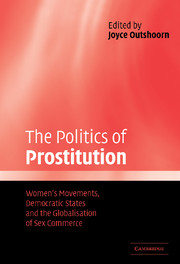 The Politics of Prostitution
The Politics of Prostitution Book contents
- Frontmatter
- Contents
- List of figures
- List of tables
- Notes on contributors
- Preface
- 1 Introduction: prostitution, women's movements and democratic politics
- 2 The women's movement and prostitution politics in Australia
- 3 Taxes, rights and regimentation: discourses on prostitution in Austria
- 4 Prostitution policies in Britain, 1982–2002
- 5 Prostitution as public nuisance: prostitution policy in Canada
- 6 Towards a new prohibitionism? State feminism, women's movements and prostitution policies in Finland
- 7 Prostitute movements face elite apathy and gender-biased universalism in France
- 8 The politics of prostitution and trafficking of women in Israel
- 9 Italy: the never-ending debate
- 10 Voluntary and forced prostitution: the ‘realistic approach’ of the Netherlands
- 11 State feminism and central state debates on prostitution in post-authoritarian Spain
- 12 Criminalising the john – a Swedish gender model?
- 13 The invisible issue: prostitution and trafficking of women and girls in the United States
- 14 Comparative prostitution politics and the case for state feminism
- Appendix 1 Independent variable indicators
- Appendix 2 Worksheets
- References
- Index
11 - State feminism and central state debates on prostitution in post-authoritarian Spain
Published online by Cambridge University Press: 22 September 2009
- Frontmatter
- Contents
- List of figures
- List of tables
- Notes on contributors
- Preface
- 1 Introduction: prostitution, women's movements and democratic politics
- 2 The women's movement and prostitution politics in Australia
- 3 Taxes, rights and regimentation: discourses on prostitution in Austria
- 4 Prostitution policies in Britain, 1982–2002
- 5 Prostitution as public nuisance: prostitution policy in Canada
- 6 Towards a new prohibitionism? State feminism, women's movements and prostitution policies in Finland
- 7 Prostitute movements face elite apathy and gender-biased universalism in France
- 8 The politics of prostitution and trafficking of women in Israel
- 9 Italy: the never-ending debate
- 10 Voluntary and forced prostitution: the ‘realistic approach’ of the Netherlands
- 11 State feminism and central state debates on prostitution in post-authoritarian Spain
- 12 Criminalising the john – a Swedish gender model?
- 13 The invisible issue: prostitution and trafficking of women and girls in the United States
- 14 Comparative prostitution politics and the case for state feminism
- Appendix 1 Independent variable indicators
- Appendix 2 Worksheets
- References
- Index
Summary
Introduction
In Spain, state intervention in the policy area of prostitution has been varied. In 1935, during the first democratic regime of Spanish history, the so-called Second Republic (1931–6), prostitution was prohibited (Decree 28 June). From the mid-1930s to 1975 Spain was governed by a right-wing authoritarian regime headed by Franco which actively opposed women's rights. In 1941, the prohibitionist law of the Second Republic was suppressed by Decree 27 March. Prostitution was tolerated and put under the surveillance and control of the police. On 18 June 1962, Spain ratified the 1949 United Nations (UN) Convention for the Suppression of the Traffic in Persons and of the Exploitation of the Prostitution of Others. Decree 168 (24 January 1963) modified the Penal Code according to the 1949 UN Convention. Broadly speaking, Spanish legislation on prostitution was abolitionist from 1963. In this view, prostitutes were not legally defined as criminals, in contrast to people who promote the prostitution of others or benefit from it; they are punished accordingly – up to six years in prison (Cebrián Franco 1977: 116; Carracedo Bullido 2001: 151–4). State and society also make serious efforts to help women stop working as prostitutes. Such abolitionist legislation considers prostitution as an affront to people's dignity; it is then irrelevant whether prostitutes voluntarily consent to prostitution or not (Carracedo Bullido 2001: 152–4).
- Type
- Chapter
- Information
- The Politics of ProstitutionWomen's Movements, Democratic States and the Globalisation of Sex Commerce, pp. 205 - 224Publisher: Cambridge University PressPrint publication year: 2004
- 2
- Cited by


